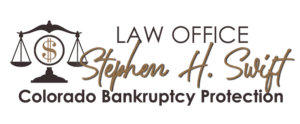
As a Colorado bankruptcy attorney, one of the most common questions I’m asked is, “How much control will creditors have over my personal possessions?” It is rarely a surprise when creditors seize automobiles, boats or other expensive luxury items, but do they really want your clothes and furniture too? Good news: unless you happen to have a collection of valuable jewelry or brand new designer clothing, those items are usually exempt from seizure and liquidation.
The bankruptcy laws exempt certain property from repossession. In most cases, you can keep all your personal property, including your vehicles. At our firm, we are skilled at using every possible exemption to protect our clients’ property.
Every state has different laws governing bankruptcy so it is always better to ask your attorney, but there are a few major things to know prior to filing. Once you file, a trustee will be assigned to your case, and he or she will have a particular interest in certain issues. Some of the biggest issues include:
Transfer of assets
Before filing for bankruptcy, it may be tempting to transfer assets out of your name, but this may actually put the property more at risk. For example, in most cases an attorney can easily protect a vehicle that is fully paid off and registered in their client’s name. But if the client had recently transferred the vehicle to a family member or friend, or even a stranger, it may be difficult to protect that vehicle from being scrutinized.
State legislatures and courts don’t want people to file for bankruptcy after they’ve transferred all of their valuable assets. If it were that simple, many people would take advantage of bankruptcy laws to discharge bad debt and hold onto their assets. People who live in states that don’t allow protection of many items must take steps to responsibly plan for bankruptcy. In Colorado, an experienced bankruptcy attorney will know the legal ways to protect assets without transferring them out of your name just before submitting a bankruptcy filing.
Cash advances
After you file for bankruptcy, each creditor will want to look closely at your account. If you have recently taken large cash advances from a credit card it could be viewed as fraudulent behavior, but even more importantly it could mean you have to pay back some or all of that cash after the bankruptcy filing.
Payments to family
Remember, if you borrowed money from your parents and siblings they might also be considered creditors. Just because you feel obligated to pay them back doesn’t mean the court considers their debt to be more important than other creditors. It is best not to make any payments to family members until your bankruptcy attorney recommends it.
Pending or current lawsuits
Bankruptcy filers who are in the midst of a current or pending litigation may not think the two cases are related, but lawsuits are also considered “assets” and must be disclosed. Your trustee might not have an interest in the suit, but you must still provide the trustee with the first opportunity to review the litigation.
Disclose any potential inheritance
If you are about to receive an inheritance of any kind, it is important to communicate this to your trustee. There are some time limits involved when an inheritance is due to you, so it would be important to mention this to your attorney.
Bankruptcy before foreclosure
If you plan to file for bankruptcy to slow down a foreclosure, this can be done. There are a few exceptions, but as long as you have other debt, such as a second mortgage or credit card debt it is legal to file before a foreclosure. Every state has different laws concerning bankruptcy and foreclosure, but filing just beforehand should buy you some time.
Bankruptcy and credit scores
Of course, one thing that bankruptcy can take from you is your good credit rating. Just like any other negative mark on your credit report, a bankruptcy filing stays on there for seven years.
What property will you be able to keep in a Colorado bankruptcy?
In a Chapter 13 bankruptcy, you won’t be forfeiting any assets because this type of bankruptcy repays your debts, but in Chapter 7 bankruptcy you may be asked to surrender some assets in exchange for paying off unsecured debts. In this case, a trustee will liquidate these assets and use the proceeds to pay your creditors.
Under Colorado Chapter 7 Bankruptcy, you select property from a state specific list of exemptions. The exemptions determine what property the trustee can sell and what property you are allowed to keep. For example, in Colorado (beginning in 2022) you are entitled to have equity in your home of up $250,000, equity in your automobiles of up to $15,000 per person or $30,000 per couple, and a fairly extensive list of other property.
This means that you can keep your home if you meet the following criteria:
- You are current on your payments to the mortgage holder on the date of filing of your bankruptcy.
- The value of your home less what you still owe on the mortgage(s) is less than $250,000. In other words, you can exempt up to $250,000 in equity on your home.
In general, the following assets are exempt in Chapter 7 bankruptcy:
- Cars with equity of less than $15,000 per person or $30,000 per couple.
- Most retirement plans such as 401(k) plans and IRAs.
- Protection of HSA accounts.
- Your personal property such as furniture, furnishings, clothes (other than furs), appliances, household goods, books, computers, T.V.’s, stereos and other items needed to furnish your home.
- Your jewelry (including wedding bands) is exempt to certain dollar amounts.
- An exemption for firearms of $1000.
- An exemption of $2500 for bank accounts.
- The tools needed to carry on a trade equal to $20,000
- Additional, other specific kinds of proper
Sometimes, exceptions may be doubled for married couples, and there are dozens of exemptions and exceptions to the rules. A good bankruptcy attorney should not submit your bankruptcy petition until he or she has protected as many of your assets as possible.
Which Assets Are Not Exempt?
In most bankruptcy filings, the following assets are not exempt from seizure: non-homestead property (e.g., vacation homes), cash savings, tax refunds, recreational vehicles, boats, fine jewelry and firearms. It will become necessary to surrender these assets to the trustee or make arrangements to “buy them back” through a financial agreement with your trustee.
If you have property, which is non-exempt, you could sell it before filing bankruptcy and use the money to purchase things which are exempt; such are food, furniture, or clothing. However, you cannot give property away to friends or relatives, and have them give it back to you after the bankruptcy. Any transfers of property without receiving fair value for it within one year before filing bankruptcy are considered a “fraudulent transfer.” The property could be taken by the bankruptcy court and sold to pay some of your debts. If the bankruptcy court finds you have been dishonest in your filing, your discharge could be denied and you could be charged with state or federal crimes.
